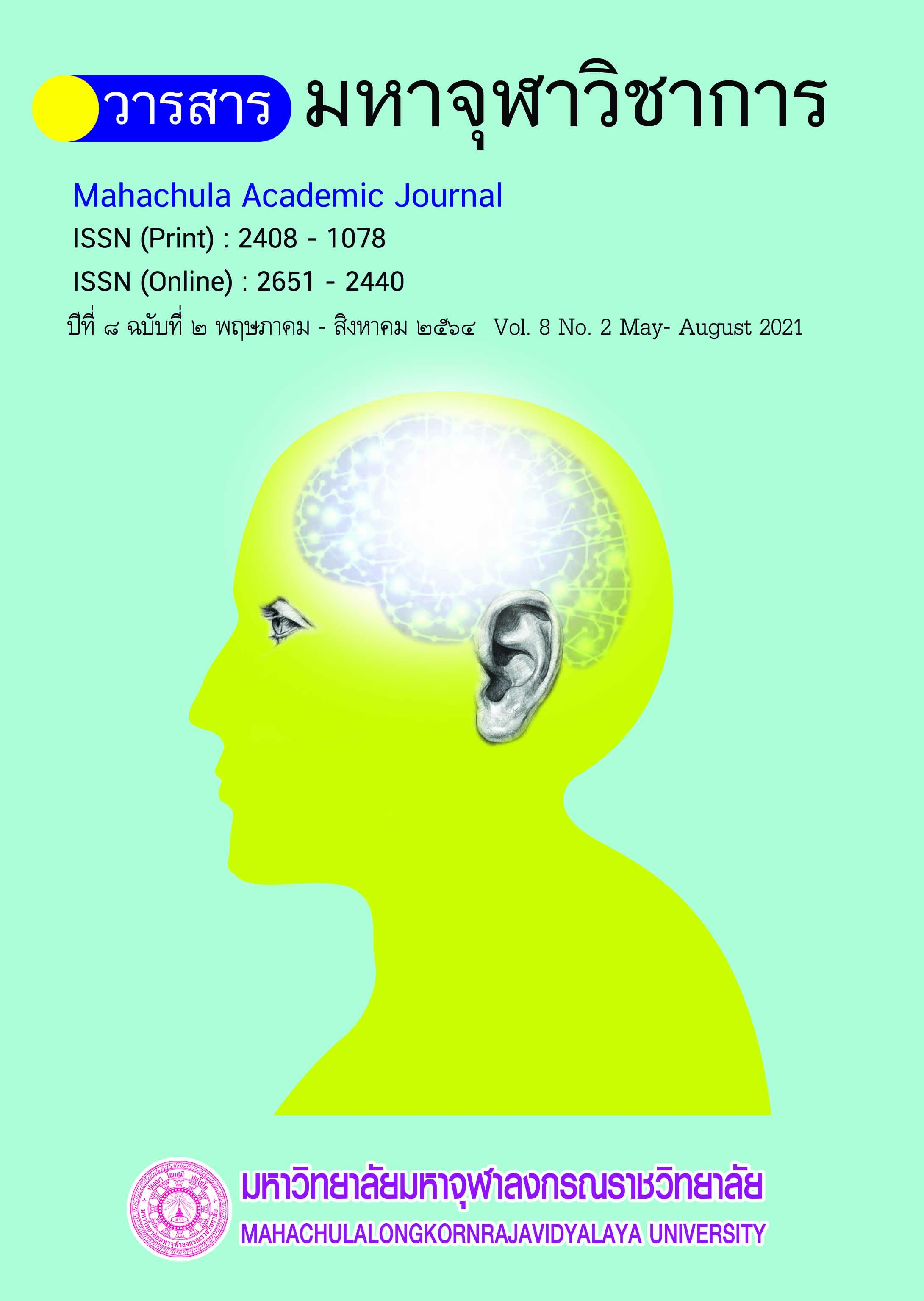The Concept of Bodhisattva as a Ground of Social and Political Philosophy
Main Article Content
Abstract
This dissertation entitled ‘An Analytical Study of the Concept of Buddha-nature in Buddhist Philosophy’ has three objectives: (1) to study the concept of Buddha-nature in Theravada Buddhist philosophy, (2) to study the concept of Buddha-nature in Mahayana Buddhist philosophy, and (3) to analyze the concept of Buddha-nature in Theravada Buddhist philosophy and Mahayana Buddhist philosophy. This is a documentary research. The objective of this study, it was to found that The concept of Bodhisattva can be taken as the Ground of philosophy, social and political research methodology. In the Studies from the scripture, the Tripitaka and books relevant study results found that: Social and political philosophy discusses the problems arising from the Human rights and justice and equality of individuals in society are complicated As well as the relationship of people in society, so it's complicated as well. In a society so there will be parents as authorised users. Who received from members of the public offering to act as parents to keep the social peace. But when the parents had no moral will cause problems in social. The concept of the Bodhisattva is the focus to help human animal from suffering with compassion. Have a strong commitment to help Human and animals cross the Samsara, The source of suffering. With such features, it can be the foundation of social and political philosophy as well.
Article Details
References
บุณย์ นิลเกษ. พุทธศาสนามหายาน. กรุงเทพมหานคร : แพร่พิทยา, ๒๕๒๖.
ประทุม อังกูรโรหิต, พระมหาประณิธานของพระโพธิสัตว์ : ข้อโต้แย้งทางปรัชญา. กรุงเทพมหานคร : โรงพิมพ์แห่งจุฬาลงกรณ์มหาวิทยาลัย, ๒๕๕๓.
พระพรหมคุณาภรณ์ (ป.อ.ปยุตฺโต). พจนานุกรมพุทธศาสตร์ ฉบับประมวลศัพท์ (ชำระเพิ่มเติมช่วงที่ ๑/เสริม). พิมพ์ครั้งที่ ๑๔. กรุงเทพมหานคร : บริษัท ธนธัชการพิมพ์, ๒๕๕๓.
นิธิ เอียวศรีวงศ์. การเมืองไทยสมัยพระเจ้ากรุงธนบุรี. พิมพ์ครั้งที่ ๑๒. กรุงเทพมหานคร : มติชน, ๒๕๕๙.
มหาจุฬาลงกรณราชวิทยาลัย. พระไตรปิฎกภาษาไทย ฉบับมหาจุฬาลงกรณราชวิทยาลัย. กรุงเทพมหานคร : โรงพิมพ์มหาจุฬาลงกรณราชมหาวิทยาลัย, ๒๕๓๙.
วศิน อินทสระ. พุทธปรัชญามหายาน. กรุงเทพมหานคร : สำนักพิมพ์มหาวิทยาลัยรามคำแหง, ๒๕๓๒.
วิทยากร เชียงกูล. ปรัชญาการเมือง เศรษฐกิจ สังคม. พิมพ์ครั้งที่ ๓. กรุงเทพมหานคร : สายธาร, ๒๕๕๒.
สมเด็จพระสังฆราชเจ้า กรมหลวงวชิรญาณวงศ์. พระปฐมสมโพธิกถา. พิมพ์ครั้งที่ ๗. กรุงเทพมหานคร : โรงพิมพ์มหามกุฏราชวิทยาลัย, ๒๔๙๘.
สมภาร พรมทา. ปรัชญาสังคมและการเมือง. พิมพ์ครั้งที่ ๒. กรุงเทพมหานคร : สำนักพิมพ์จุฬาลงกรณ์มหาวิทยาลัย, ๒๕๓๙.
สมภาร พรมทา. พุทธศาสนามหายานนิกายหลัก. พิมพ์ครั้งที่ ๑. กรุงเทพมหานคร : สำนักพิมพ์แห่งจุฬาลงกรณ์มหาวิทยาลัย, ๒๕๔๐.
สุมาลี มหณรงค์ชัย. พุทธศาสนามหายาน (ฉบับปรับปรุงแก้ไข). กรุงเทพมหานคร : สำนักพิมพ์สุขภาพใจ, ๒๕๔๓.
สุมาลี มหณรงค์ชัย. พุทธศาสนามหายาน (ฉบับปรับปรุงแก้ไข). กรุงเทพมหานคร : สำนักพิมพ์ศยาม, ๒๕๕๒.
เสฐียร พันธรังสี ราชบัณฑิต, ศ.พิเศษ. พุทธศาสนามหายาน. พิมพ์ครั้งที่ ๔. กรุงเทพมหานคร : สำนักพิมพ์สุขภาพใจ, ๒๕๔๓.
เสถียร โพธินันทะ. ชุมนุมพระสูตรมหายาน. กรุงเทพมหานคร : สำนักพิมพ์บรรณาคาร, ๒๕๑๖.
เสถียร โพธินันทะ. ปรัชญามหายาน. พิมพ์ครั้งที่ ๖. กรุงเทพมหานคร : โรงพิมพ์มหามกุฏราชวิทยาลัย, ๒๕๕๕.
อภิชัย โพธิ์ประสิทธิ์ศาสต์. พระพุทธศาสนามหายาน. กรุงเทพมหานคร : กรุงสยามการพิมพ์, ๒๕๒๐.
ทวี สุรฤทธิกุล. ระบอบประชาธิปไตยอันมีพระมหากษัตริย์ทรงเป็นประมุข. [ออนไลน์]. แหล่งที่มา https://siamrath.co.th/n/๑๙๖๗๕, [๑ มีนาคม ๒๕๖๒].
พระบรมราโชวาท. พระปฐมบรมราชโองการเนื่องในพระราชพิธีบรมราชาภิเษก. [ออนไลน์]. แหล่งที่มา https://thaipsyop.wordpress.com. [๒๕ กุมภาพันธ์ ๒๕๖๒].


